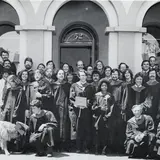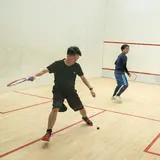A team of four Yale students including MBA candidate Eva Leung ’21 won the 2020 HUD Innovation in Affordable Housing (IAH) Student Design and Planning Competition. The team received a $20,000 prize, beating out finalist teams from the University of Maryland, College Park; University of Michigan, Ann Arbor; and University of California, Berkeley. Each team submitted proposals that were evaluated in a blind review by industry experts.
Sponsored by Housing and Urban Development’s Office of Policy Development and Research, the annual HUD IAH Student Design and Planning Competition challenges multi-disciplinary teams comprising graduate students in architecture, planning and policy, finance, and other areas to address social, economic, and environmental issues in responding to a specific housing problem developed by an actual public housing agency. In 2020, the agency was in Santa Fe, New Mexico.
Of her team’s proposal for a site in Santa Fe, Leung said, “Our design principles were centered around ‘resilience’—environmentally, financially, and socially—and the features were designed to encourage a strong sense of community self-determination for both the residents of the development and its neighbors. Our project features 158 units, and it is a deeply targeted mixed-income development with 98 affordable units for households earning 30% to 80% AMI. To address the particular needs for women, children, and young families in Santa Fe, we designed features such as daycare, nurse stations, and on-site employment opportunities, and explored partnerships with local nonprofits to provide healthy but affordable fresh food delivery for residents. In terms of financial sustainability, the main innovation was a creation of an equity scheme that will help residents to build a path to ownership in the eventual ‘limited equity cooperative’ model. This was received positively by the judges.”
“I was truly honored by this opportunity to leverage my real estate experience to design a financially and architecturally sustainable project that addresses the very real need for affordable housing not only in Santa Fe, but also the broader United States,” Leung added.
View the Yale team’s presentation.




